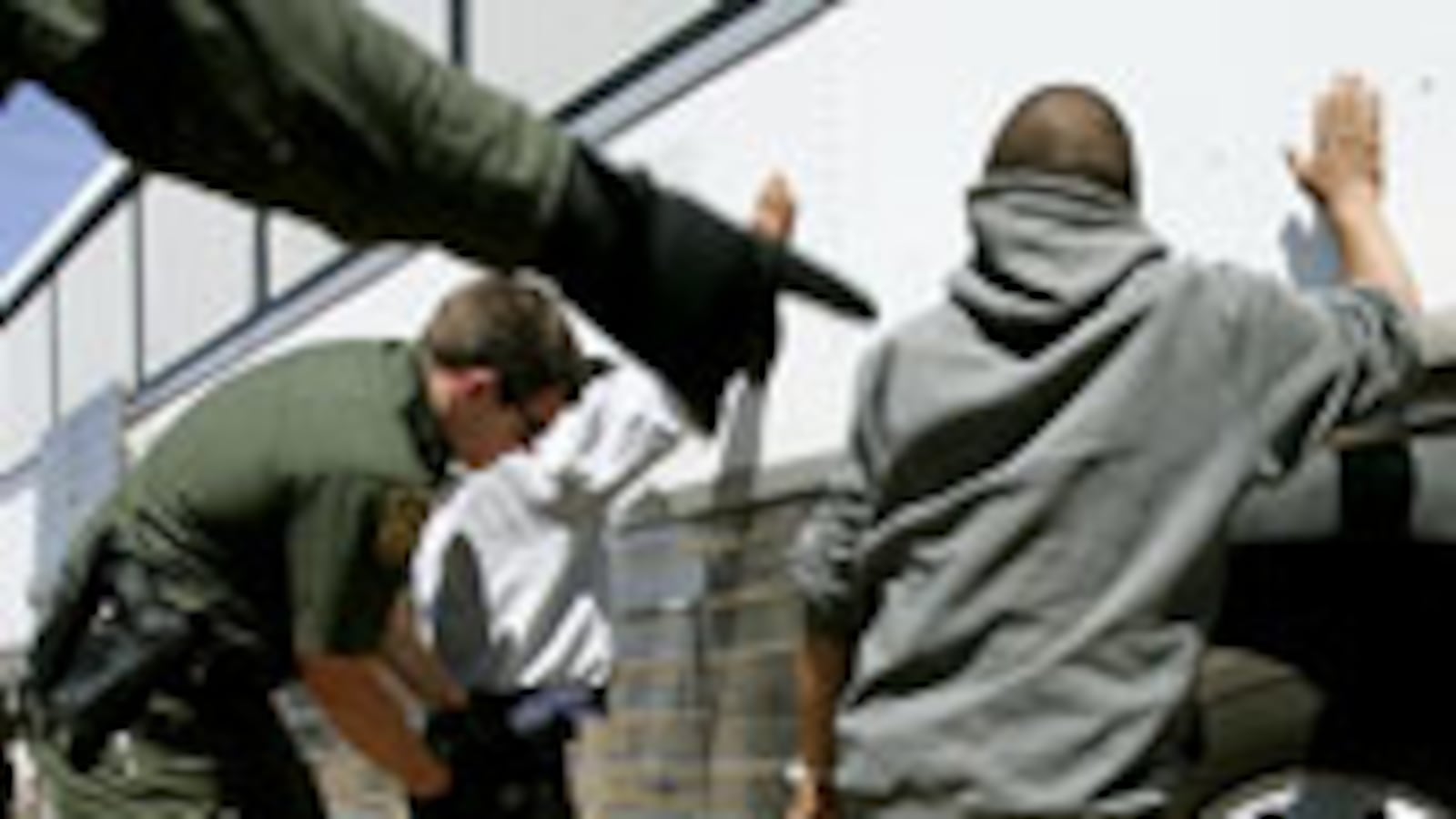
On Tuesday, Ian Danley, a tall 28-year-old youth pastor for Neighborhood Ministries, a downtown Phoenix Evangelical church, stood in front of the Arizona Capitol in Phoenix with a group of pastors and businessmen. They weren’t natural allies, but the latest bill making its way through the state legislature had brought evangelicals and shopkeepers together in an unusual coalition. The measure galvanizing the group was no ordinary bill—but rather the most sweeping immigration reform in the country.
If it passes—and it took a giant leap toward victory when the state House voted it through that day—the bill would criminalize Arizona’s 460,000 unauthorized immigrants for trespassing on Arizona soil, turn local police authorities into immigration enforcers, and make lawbreakers out of U.S. citizens who invite immigrants they know to be “illegal aliens” to dinner in their homes, drive them to church, host them as overnight guests, teach them in school, or otherwise “harbor” them. The bill prohibits day laborers from seeking work on Arizona sidewalks and other public places, and allows Arizona citizens to sue local police agencies whom they deem ineffective in sending all those hotel maids and dishwashers back to Mexico.
“It’s almost like the law is forcing our police departments to act in racist ways,” Danley says.
Danley is a member of Arizona Interfaith Network, a coaliton of Evangelicals, Catholics, Mormons and other denominations that joined forces with local business and civil-rights groups to lobby against the trespassing bill on constitutional, economic, and moral grounds. In his eyes, and those of his allies, the “trespass” bill is an unfunded mandate that would effectively institutionalize racism, open the state up to lawsuits, force police to enforce immigration instead of keeping communities safe, and discourage new businesses from setting up shop in Arizona.
Members of Danley’s unlikely alliance have their work cut out for them. Unless Danley and company can perform a political miracle, the “trespass” bill is rocketing toward approval in a final vote by the state Senate—and likely approval by conservative Republican Gov. Jan Brewer. The real battle over the bill is likely to be fought out in the courts, on constitutional grounds.
"It would be very difficult for police to avoid racial profiling because of this law," said Danley, who believes the Bible asks all Christians to be kind to immigrants. "It’s going to be hard for police departments not to racially profile. It's almost like the law is forcing our police departments to act in racist ways."
Conservative groups hailed the trespassing bill as a step in the right direction. “Arizona is doing what the federal government has failed to do,” said Ira Mehlman, a spokesman for Federation for American Immigration Reform, which favors immigration enforcement and overall reduction. “We certainly support the bill.”
Immigrant advocates fear the trespassing bill is a possible model for other states to follow—but also view it as a way to jump-start immigration-reform talks in Washington. And the bill is sure to become a thorn in GOP Sen. John McCain’s side, as he seeks to fend off a fierce primary challenge from his right from former Rep. J.D. Hayworth, who has been bashing the incumbent for failing to do enough to police the borders.
McCain was in Washington on Tuesday, and staffers did not answer calls and emails seeking comment on the trespassing bill. In the past, Brooke Buchanan, a McCain spokeswoman, has said that McCain would not comment on state bills. McCain sponsored bipartisan comprehensive federal immigration reform in 2006, along with Sen. Ted Kennedy, but the measure failed. McCain staffers say he has been calling for National Guard troops on the border for months.
State Sen. Russell Pearce, a tenacious Republican, has often said he wants to make Arizona as unpleasant for unauthorized immigrants as possible. He has introduced versions of the trespassing bill over the years. But rising anxiety about the violent drug trade across the Mexican border—and the murder of a borderlands rancher named Robert Krentz, under mysterious circumstances some believe suggest a Mexican assailant—have changed the equation. Pearce invoked Krentz’s unsolved murder to successfully convince waffling moderate Republicans to vote yes this time around.
Hours after the bill passed, stressed-out unauthorized immigrants, who are already barred from legally working and driving in Arizona, heard the news on Spanish-language media and prepared themselves for more unpleasantness. (Many immigrants in Arizona have family members who are American citizens, and don’t feel they can pull up stakes and leave the state.)
Rep. Luis Gutierrez, an Illinois Democrat who has introduced a very different immigration-reform bill at the federal level, blasted President Obama the day after the Arizona measure passed: “Arizona is taking yet another step toward declaring open season on immigrants and on people who look like immigrants and more damage is being done to our communities in the absence of the Obama administration's leadership on the issue,” Gutierrez wrote in an emailed statement. His reform bill would prevent states like Arizona from “discriminatory measures that promote systematic racial profiling,” he said, and would “legalize undocumented immigrants.”
In response to criticism that the Obama administration has done nothing, Secretary Janet Napolitano, who’s been sharply criticized by immigrant advocates for focusing only on enforcement and for leading an agency with quotas of immigrants to be deported, said through Department of Homeland Security spokesman Matt Chandler that she’s “looking forward” to working with Congress on immigration reform. In an email, Chandler indicated that Napolitano has had more than 36 meetings with congressmen and senators over immigration reform.
• Conor Friedersdorf: Immigration Policy Gone Loco“Latinos know that when the immigration debate turns nasty, it’s not just about undocumented immigrants, it's about Latinos,” said Clarissa Martinez, director of immigration for the National Council of La Raza. “You will see a great deal of activity in Arizona as we try to educate people about drastic overreach and consequences of this law.”
Coincidentally, on the same day the trespassing bill was passed, the National Association of Evangelicals, a coalition of hundreds of Evangelical churches, vowed to push hard for federal immigration reform. Evangelicals believe the Bible wants them to be kind to foreigners in their land, and, perhaps more importantly, they want to win over as many souls as possible. Evangelical churches have long recruited Latino immigrants. Many immigrants in Arizona have forsaken their traditional Catholic religion for Evangelical churches like Danley’s.
For his part, he’s hoping for federal legislation that could trump the state bill. He’s vowed to stay the course and take care of the flock, but he’s mightily discouraged. He knows he and other church members could get arrested for doing Christian work, like teaching, hosting church suppers, or driving the faithful in vans.
“Nothing changes for us,” Danley said after the bill was passed. “We don’t ask people for documents so they can hear about Jesus. If they want to arrest us for that, then they’ll just have to do it.”
Terry Greene Sterling is an Arizona journalist who blogs about immigration in Phoenix at terrygreenesterling.com. Her book, ILLEGAL, Life and Death in the Undocumented Underground, will be published in August by the Globe Pequot Press.





